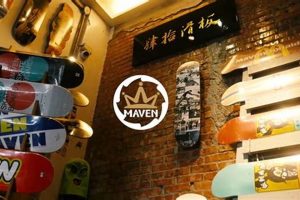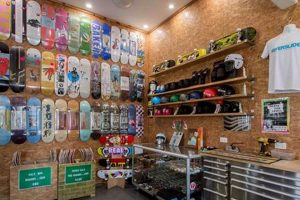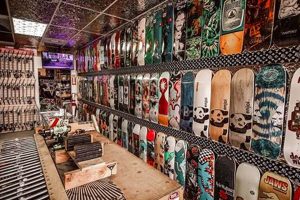A specialized retail establishment provides equipment, apparel, and accessories tailored for skateboarding enthusiasts. This type of business typically offers a range of products, from skateboards and components to protective gear and related merchandise. For example, such a storefront might stock various skateboard decks, trucks, wheels, bearings, and hardware, alongside helmets, pads, and skate-specific shoes.
These businesses play a vital role in the skateboarding community by supplying quality products and fostering a hub for skaters of all skill levels. Historically, they have served as meeting points, offering advice, sponsoring local events, and contributing to the growth of skateboarding culture. The availability of reliable equipment from a dedicated source ensures safer participation and supports the advancement of the sport.
The subsequent sections will delve into the nuances of selecting appropriate skateboarding equipment, understanding different product features, and appreciating the impact of these establishments on the broader skateboarding landscape. These insights aim to provide a comprehensive overview for both novice and experienced skaters.
Expert Guidance
The following guidance aims to provide valuable insights for skaters of all levels, focusing on product selection and maintenance for optimal performance and safety.
Tip 1: Deck Selection: Deck choice significantly impacts performance. Consider deck width based on shoe size and skating style. Wider decks offer increased stability, while narrower decks facilitate quicker maneuvers. For instance, a street skater may prefer a deck width of 8.0″ to 8.25″, whereas a transition skater might opt for 8.25″ or wider.
Tip 2: Truck Compatibility: Ensure trucks are appropriately sized for the chosen deck. Overhang or insufficient width can negatively affect stability and turning. Measure the deck width and select trucks with a corresponding axle width to achieve optimal performance. Mismatched components can lead to reduced control and potential equipment failure.
Tip 3: Wheel Durometer: Wheel durometer, or hardness, dictates the wheel’s suitability for various terrains. Softer wheels (78a-85a) provide better grip on rough surfaces, while harder wheels (99a-101a) offer increased speed and slide capability on smooth surfaces. Street skaters often prefer harder wheels, while cruisers benefit from softer wheels.
Tip 4: Bearing Maintenance: Regular bearing maintenance prolongs lifespan and ensures smooth rolling. Clean bearings periodically with appropriate solvents and lubricate them with skate-specific oil. Neglecting bearing maintenance can result in reduced speed and eventual bearing failure.
Tip 5: Hardware Inspection: Routinely inspect all hardware, including bolts, nuts, and kingpins, for signs of wear or damage. Loose hardware can compromise safety and performance. Replace worn or damaged components promptly to prevent accidents. Over-tightening hardware can also lead to damage, so appropriate torque is critical.
Tip 6: Protective Gear: Prioritize safety by consistently wearing appropriate protective gear. Helmets, knee pads, elbow pads, and wrist guards significantly reduce the risk of injury. Ensure protective gear fits properly and is in good condition. Replacing damaged gear is essential for maintaining optimal protection.
These recommendations highlight the importance of informed product selection, routine maintenance, and a commitment to safety. Adherence to these practices can enhance the skateboarding experience and minimize the risk of injury.
The next stage focuses on understanding the long-term benefits of investing in quality skateboarding equipment and maintaining it to professional standards.
1. Quality Skateboarding Products
A direct correlation exists between a skateboarding retailer’s viability and the quality of products it offers. For a skateboarding business to thrive, the products must be reliable, durable, and perform as expected. Supplying inferior goods inevitably leads to customer dissatisfaction, reputational damage, and ultimately, business failure. For example, selling skateboards with poorly constructed decks prone to snapping or wheels with low-grade bearings results in diminished customer loyalty and negative word-of-mouth.
The inclusion of top-tier equipment is not merely a preference but a critical element. A reputable skateboarding business establishes itself by providing items that meet stringent safety and performance criteria. This involves stocking decks from reputable manufacturers known for using high-quality materials, trucks that provide precise control, and wheels designed for optimal grip and speed. By emphasizing product integrity, the retailer cultivates trust and positions itself as a knowledgeable and dependable source for skateboarding supplies. For instance, a retail store carries specific brands known for their quality control to ensure customer experience is positive.
The implications of this understanding are far-reaching. Skaters depend on their equipment for safety, performance, and enjoyment. Stores that consistently offer superior products contribute to the overall growth and legitimacy of skateboarding. The commitment to offering quality skateboarding products is integral to establishing a strong presence and enduring success in the skateboarding market. This is essential for building a robust customer base, fostering community loyalty, and sustaining long-term profitability.
2. Expert Product Knowledge
The success and credibility of a skateboarding retail establishment are inextricably linked to the depth of product knowledge possessed by its staff. Stores operating without knowledgeable personnel are demonstrably less effective at serving the needs of skateboarders, both novice and experienced. The ability to provide accurate and insightful information regarding deck construction, truck geometry, wheel durometer, and bearing specifications directly influences customer satisfaction and purchasing decisions. Stores which lack expertise may misguide buyers, leading to inappropriate equipment choices and potentially hazardous outcomes.
A knowledgeable staff serves as a crucial resource for skateboarders seeking to optimize their equipment setup. For instance, understanding the implications of different truck heights on ollie performance or the impact of wheel size on acceleration and top speed allows sales associates to provide tailored recommendations based on individual skating styles and preferences. Similarly, the capacity to diagnose and resolve common equipment issues, such as bearing maintenance or hardware replacement, fosters trust and reinforces the store’s value as a reliable source of skateboarding expertise. Examples of this include a store employee explaining the difference between conical and cylindrical wheels for specific grinds or recommending a specific type of bearing lubricant for optimal performance.
In conclusion, “Expert Product Knowledge” is not merely a desirable attribute for a “prodigy skate shop” but a fundamental requirement for its long-term viability. The capacity to deliver informed guidance, troubleshoot technical problems, and provide customized recommendations directly enhances customer satisfaction, promotes responsible skateboarding practices, and ultimately strengthens the store’s position as a trusted authority within the skateboarding community. Without this expertise, the establishment risks becoming a mere distributor of goods, forfeiting the opportunity to cultivate a loyal customer base and contribute meaningfully to the skateboarding culture.
3. Community Engagement Initiatives
A crucial determinant of success for a “prodigy skate shop” lies in its active involvement in “Community Engagement Initiatives.” These initiatives, encompassing events, sponsorships, and collaborative projects, cultivate a sense of belonging and shared identity among skateboarders. The absence of such engagement can result in isolation from the skateboarding community, diminishing the retailer’s relevance and appeal. For example, organizing local skate competitions, workshops, or demonstrations not only promotes skateboarding but also positions the shop as a central hub for enthusiasts.
The benefits of proactive community involvement extend beyond mere brand visibility. Sponsoring local skaters or teams provides financial and material support, fostering talent development and loyalty. Collaborating with local artists or organizations on skateboarding-related projects strengthens community bonds and enhances the shop’s image. Furthermore, offering workshops or educational programs on skateboarding safety, equipment maintenance, or trick tutorials can attract new skaters and build trust with existing customers. A practical example would be a shop partnering with a local school to provide skateboarding safety demonstrations or hosting a “learn to skate” day for beginners.
In summation, “Community Engagement Initiatives” are not merely optional add-ons but integral components of a thriving “prodigy skate shop.” They serve as catalysts for community building, brand loyalty, and sustained growth. By actively participating in and supporting the skateboarding community, the shop establishes itself as more than just a retailer but as a valued resource and advocate for the sport. Overlooking these initiatives can lead to missed opportunities, weakened customer relationships, and ultimately, a less sustainable business model.
4. Strategic Inventory Management
Strategic inventory management significantly affects the performance and profitability of a skateboarding retail establishment. Inefficient stock control leads to lost sales, increased storage costs, and ultimately, reduced revenue. A “prodigy skate shop” that fails to align its inventory with customer demand risks carrying excessive stock of slow-moving items while simultaneously lacking popular or trending products. This disconnect between supply and demand results in dissatisfied customers who may seek alternatives elsewhere. For example, a store might be overstocked with outdated skateboard decks while consistently running out of high-demand truck models, leading to customer frustration and lost sales opportunities.
Effective inventory management requires a comprehensive understanding of market trends, customer preferences, and seasonal variations. Analyzing sales data, tracking competitor offerings, and engaging with the local skateboarding community provides valuable insights for informed purchasing decisions. By accurately forecasting demand, a “prodigy skate shop” can optimize its stock levels, minimize waste, and maximize profitability. Furthermore, implementing a robust inventory tracking system, whether manual or automated, enables real-time visibility into stock levels, facilitating timely replenishment and preventing stockouts. Consider the example of a retail location which uses point of sale data to identify products with high turnover and adjusts ordering habits accordingly.
In conclusion, strategic inventory management is not merely an operational detail but a critical determinant of success for a “prodigy skate shop”. It necessitates a data-driven approach, informed by market intelligence and a deep understanding of customer needs. Overlooking inventory management leads to financial losses, eroded customer loyalty, and ultimately, a diminished competitive advantage. Prioritizing efficient stock control and adapting to evolving market dynamics are essential for sustaining long-term viability and thriving within the competitive skateboarding retail landscape.
5. Customer-Focused Service
Customer-focused service functions as a critical differentiator in the competitive landscape of skateboarding retail. For a “prodigy skate shop,” the delivery of exceptional customer experiences directly impacts customer loyalty, brand reputation, and overall profitability. The cause-and-effect relationship is evident: attentive, knowledgeable service fosters customer satisfaction, leading to repeat business and positive word-of-mouth referrals. Conversely, indifferent or inadequate service contributes to customer dissatisfaction, potentially driving them to competitors. The importance of customer-focused service stems from the specialized nature of skateboarding equipment. Customers often require guidance in selecting appropriate products based on their skill level, skating style, and personal preferences. Real-life examples include a retail assistant helping a beginner choose a suitable skateboard setup or an experienced skater receiving expert advice on upgrading their trucks for improved performance.
The practical significance of this understanding is multifaceted. Investing in staff training to enhance product knowledge and customer service skills is paramount. Implementing customer feedback mechanisms, such as surveys or online reviews, allows the “prodigy skate shop” to identify areas for improvement and tailor its services to meet evolving customer needs. Moreover, cultivating a welcoming and inclusive environment fosters a sense of community, encouraging customers to view the shop as a trusted resource and gathering place. Extended support in the form of repair services, customization options, and events related to skateboarding contribute to value and a unique shopping experience.
In summary, customer-focused service is not merely a supplementary aspect of a “prodigy skate shop” but a fundamental component of its success. By prioritizing customer needs, providing expert guidance, and fostering a supportive community, the shop can cultivate lasting relationships and establish a strong competitive advantage. Challenges may include maintaining consistency in service quality across all staff members and adapting to evolving customer expectations. However, a steadfast commitment to customer-focused service remains essential for sustaining long-term growth and solidifying the “prodigy skate shop’s” position as a leader in the skateboarding retail market.
6. Competitive Pricing Dynamics
Competitive pricing dynamics constitute a significant factor in the operational strategy and market positioning of any retail establishment, including a “prodigy skate shop.” The ability to navigate this complex landscape directly influences the store’s capacity to attract customers, maintain profitability, and sustain a competitive edge. An understanding of these dynamics necessitates considering various facets of pricing strategies and their implications within the specific context of skateboarding retail.
- Cost-Plus Pricing vs. Value-Based Pricing
Cost-plus pricing, wherein a fixed markup is added to the cost of goods, offers simplicity but may not reflect market demand. Value-based pricing, which considers the perceived value of the product to the customer, can justify higher prices for premium or unique items. A “prodigy skate shop” must balance these approaches, potentially using cost-plus for commodity items and value-based pricing for specialized or limited-edition products. The choice between these methods impacts the business’s competitive positioning and profit margins.
- Competitor Analysis and Price Matching
Monitoring competitor pricing strategies is essential for remaining competitive. Price matching, where the store offers to match a competitor’s price, can attract price-sensitive customers. However, engaging in aggressive price wars may erode profit margins. A “prodigy skate shop” must carefully analyze competitor pricing, considering factors like product quality, customer service, and brand reputation before implementing a price-matching strategy. This involves assessing whether the business can sustain lower prices without compromising its core values.
- Promotional Pricing and Discount Strategies
Promotional pricing, including sales, discounts, and bundled offers, can stimulate demand and clear inventory. However, overuse of promotions can devalue the brand and train customers to expect discounts. A “prodigy skate shop” must strategically use promotions, targeting specific products or customer segments, and avoiding perpetual sales. Limited-time offers or exclusive discounts for loyal customers can incentivize purchases without sacrificing perceived value.
- Impact of Online Retailers and E-commerce
Online retailers often offer lower prices due to reduced overhead costs. A “prodigy skate shop” must address this challenge by emphasizing value-added services, such as expert advice, personalized fitting, and community engagement. Offering a seamless online shopping experience, with competitive pricing and convenient shipping options, can also mitigate the impact of online competition. Successfully navigating this environment involves strategically aligning brick-and-mortar operations with the demands and price points established by digital commerce.
These facets collectively shape the competitive pricing dynamics that a “prodigy skate shop” must navigate. Failure to adapt to these dynamics can result in reduced sales, diminished profitability, and a loss of market share. By carefully considering cost structures, competitor actions, promotional strategies, and the impact of online retail, a “prodigy skate shop” can develop a pricing strategy that attracts customers, sustains profitability, and reinforces its position within the skateboarding community.
7. Online Retail Integration
Online retail integration is now indispensable for “prodigy skate shop.” The lack of an online presence limits a shop’s reach, restricting it to local customers and diminishing its potential for growth. The integration of e-commerce platforms, social media engagement, and digital marketing strategies expands the customer base, extending the reach beyond geographical limitations. For example, a skateboard shop in California can serve customers in New York through effective online retail integration, leading to increased sales and brand recognition. The cause is the necessity of increasing customer reach, and the effect is sales growth that helps sustain the “prodigy skate shop”.
Practical applications of this integration include offering a comprehensive online catalog of products, implementing secure online payment systems, and providing efficient shipping options. Moreover, engaging with customers through social media channels allows “prodigy skate shop” to build brand loyalty, provide customer support, and showcase new products. Real-life examples include shops that utilize Instagram to display skateboard tricks performed by sponsored skaters while simultaneously linking to product pages, or shops which create YouTube videos demonstrating skateboard maintenance and then direct viewers to the parts needed on their site. These strategies offer convenient shopping while supporting and building a community.
In summary, online retail integration is no longer optional for a successful “prodigy skate shop;” it is a fundamental requirement. Addressing challenges such as managing inventory across multiple channels and ensuring secure online transactions is crucial. Embracing online retail integration allows “prodigy skate shop” to broaden its customer base, enhance brand visibility, and thrive in an increasingly digital marketplace. The evolution is from brick and mortar business to a full omnichannel retail.
Frequently Asked Questions
The subsequent section addresses common inquiries regarding specialized skateboarding retailers, providing clarity on essential aspects of their operations and product offerings.
Question 1: What distinguishes a specialized skateboarding retailer from general sporting goods stores?
Specialized establishments offer a curated selection of skateboarding-specific equipment, possess in-depth product knowledge, and often foster a community-oriented environment. General sporting goods stores typically carry a broader range of products with less focused expertise.
Question 2: How frequently should skateboard bearings be cleaned and lubricated?
Bearing maintenance frequency depends on usage and environmental conditions. Under normal circumstances, cleaning and lubrication are recommended every one to three months. In dusty or wet conditions, more frequent maintenance may be necessary.
Question 3: What considerations are paramount when selecting a skateboard deck?
Critical factors include deck width, length, concave, and material composition. Skaters should consider their shoe size, skating style, and personal preferences when making a selection.
Question 4: What are the implications of wheel durometer on skateboarding performance?
Wheel durometer, or hardness, affects grip, speed, and durability. Softer wheels provide better grip on rough surfaces, while harder wheels offer increased speed and slide capabilities on smooth surfaces.
Question 5: Is protective gear essential for all skateboarding activities?
The use of protective gear, including helmets, knee pads, elbow pads, and wrist guards, is strongly recommended for all skateboarding activities, regardless of skill level, to minimize the risk of injury.
Question 6: How does a skateboarding retail shop contribute to the local skateboarding community?
These establishments often sponsor local skaters and events, provide a gathering place for enthusiasts, offer expert advice, and contribute to the overall growth and promotion of skateboarding culture.
These responses offer insights into the distinctive nature, maintenance requirements, and community contributions associated with dedicated skateboarding retail.
The following section will transition to exploring advanced techniques in skateboarding and equipment maintenance.
Conclusion
This exploration has elucidated the multifaceted aspects of a “prodigy skate shop,” highlighting its critical role in the skateboarding ecosystem. From the provision of quality skateboarding products and expert knowledge to the implementation of community engagement initiatives and strategic inventory management, each element contributes to the shop’s viability and relevance. Customer-focused service, competitive pricing dynamics, and effective online retail integration further augment its capacity to thrive in a competitive market.
The sustained success of any “prodigy skate shop” hinges on its ability to adapt to evolving market trends, prioritize customer satisfaction, and foster a genuine connection with the skateboarding community. A commitment to these principles will not only ensure its long-term sustainability but also contribute to the continued growth and development of skateboarding as a sport and a culture. Continued learning and adaptation are crucial to navigating the ever-changing landscape of the skateboarding retail industry.







